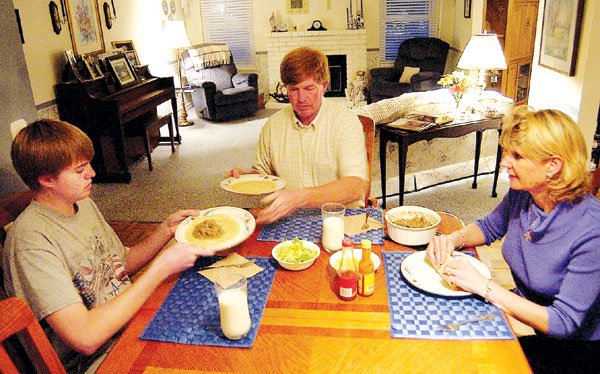As night falls, Erin Monroe is almost ready for dinner, but the
table in her home is more than a place to eat. It’s a time for her
and her husband to reconnect with their children, 15-year-old Danny
and 12-year-old Sean.
”
We always start with prayer, and that kind of centers us,
”
said Monroe.
”
Then we share the meal.
”
As night falls, Erin Monroe is almost ready for dinner, but the table in her home is more than a place to eat. It’s a time for her and her husband to reconnect with their children, 15-year-old Danny and 12-year-old Sean.
“We always start with prayer, and that kind of centers us,” said Monroe. “Then we share the meal.”
Getting the family together is harder than it used to be, admits the Gilroy resident. Both boys are actively involved in sports, but Monroe and her husband, Mike, attempt to wrangle the family around the table at least four nights per week.
Once there, the family members all share their best and worst moments from the day, and most of their conversations flow from these exchanges.
Families today may look nothing like the Cleavers. Dinner isn’t piping hot and ready to serve when Dad gets home from work. It’s probably not going to land on the table at 6pm sharp or even be totally home-cooked, but that’s not the point.
In a world of distractions, the importance of the family dinner table may be greater than ever.
“We live in a very rushed, very hurry-up world,” said Vicky Tamashiro, assistant program director at Chamberlain’s Mental Health in Gilroy. “I see too many families keeping in touch with one another with cell phones and text messaging. We lose contact with one another much too easily.”
Dining as a family can restore some of those bonds, said the Rev. Bob Hammond, pastor of St. Augustine’s Anglican church and principal of Ladd Lane Elementary School in Hollister.
Amid the chatter of television and computers, he’s afraid we’re selling our kids short, but that dining together is “one of the most neglected and truly important things we can do,” to quell the problem.
If parents are willing to give their children some time to shine, said Hammond, they’ll reap the rewards.
“(Children) get recognition of their own worth, they have an opportunity to be heard and they have an opportunity to hear and see their parents modeling a positive experience when they sit together,” said Hammond.
To maximize this brief interlude of family togetherness, experts recommend a few ground rules be set in place to clear communication lines and establish precedents for future get-togethers.
The first, and likely most important, is to narrow the family’s focus. To spend quality time together, try blocking the rest of the world out, advised Tamashiro.
“I would say no guests, no TV on, phone calls going to the answering machine and no text messaging,” said Tamashiro. “I also wouldn’t do it on a night when kids are likely to want to go out. If you do it on a Friday or a Saturday night, of course they’ll be restless.”
Setting an appropriate tone for the meal can also be critical to a positive perception of the family dining experience. Hammond suggested taking time out of each meal to reflect on positive points from the day.
“Everybody in the family should share one positive experience about the day, about each other or about somebody,” said Hammond. “Dinners can be a whining session and that’s not a good conversation builder.”
Not everything at the table has to be positive said, Barbara Sachs, a Morgan Hill Ph.D. marriage and family therapist.
Rather, she sees it as a place of open conversation. If a child is having conflict at school or a problem they wish to share, it should be a place of affirmation and problem-solving, said Sachs.
“Don’t bring up something that would be a (sore spot) or a discipline problem with a specific child,” said Sachs. “Discuss that another time. I would say the main emphasis is on the bonding, the continuing of the communication, as well as on the boundaries.”
While family bonding should encourage children to share their joys and conflicts with their parents, the adults need to maintain an edge of authority, said Sachs.
If a child describes an inappropriate social situation, it’s the parent’s job to say something about the issue, she said, because children will push their limits in order to find boundaries of acceptable behavior.
“Where boundaries are caring and reasonable, yet protective, they incorporate these into themselves, so as they emerge from the home they are better able to function in society,” said Sachs.
Finally, it’s the parent’s job to keep the dinners going, said Dan Derry, pastor of St. Mary Catholic Parish in Gilroy.
“I can’t quite imagine marriage and family life without that as a regular part of the day,” said Derry. “If this is your first set of priorities and first set of teachings, it should also be the first set of your loyalties.”
Pull up a seat. At the family table, you’re always welcome.
Can’t make dinner?
Can’t find a time that works well for your family to have dinner even one night a week? Rather than forcing your kids to restructure their social lives radically, start small.
Find a meal that will work for your family, even if it’s only once a week, said Vicky Tamashiro, assistant program director of Chamberlain’s Mental Health in Gilroy.
“You could do lunch or breakfast, whichever is easier,” said Tamashiro. “If there’s a time that’s impossible, if it’s not going to include everybody or if there’s going to be resentment, don’t do it.”












